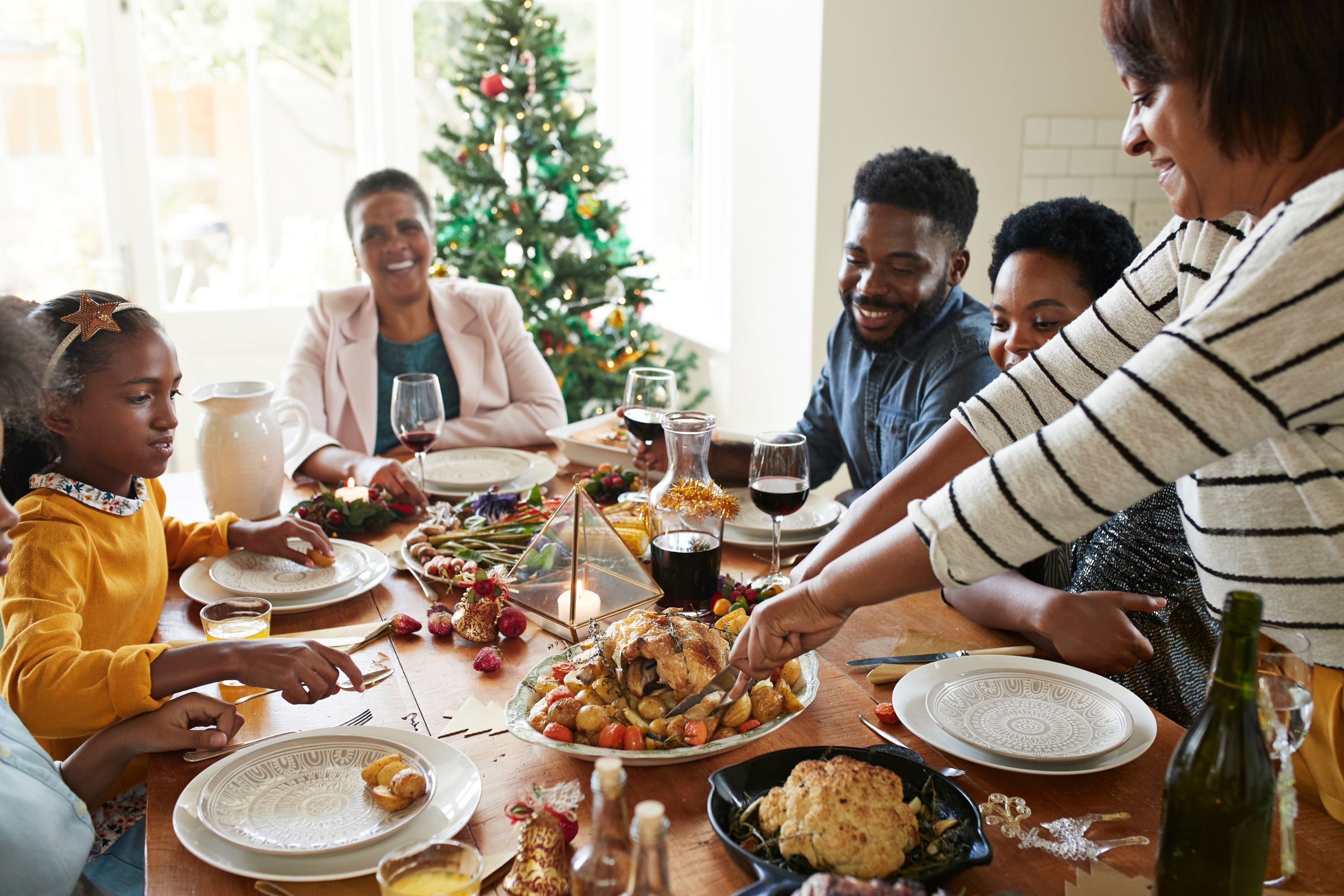
Could Christmas dinner help you conceive? Apparently so, and these are the five festive foods you should be eating.
It's no secret that more babies are conceived at Christmas, but while many think that's because couples are spending more time cuddled up under the covers during the cold weather, could the festive food we eat be responsible for the autumn baby boom?
That's right, if you're wondering how to increase fertility it turns out your Christmas dinner could be packed with fertility foods that will help to conceive. Improved fertility for both men and women has been associated with diets high in unsaturated fats, whole grains, vegetables, and fish, according to a study published by the scientific journal, Frontiers in Public Health. And with this in mind, fertility specialist at Fertility Family Dr Gill Lockwood has shared her insights into the foods that could help you conceive this Christmas.
So, if you're trying for a baby, make sure to indulge in these five festive foods this year...
Christmas foods to embrace while trying to conceive
1. Turkey
The traditional Christmas turkey is supportive of fertility, thanks to the boost of iron and zinc it provides. For those that don’t like turkey, other lean meats such as beef and lamb offer the same benefits. Alternatively, smoked salmon is another Christmas classic that can help with fertility.
Dr Lockwood explains: "Turkey is the ideal protein source as this favourite Christmas meat is low in fat and high in iron. Not only are a person’s iron stores the only source of iron for their baby’s blood, but people who are iron-deficient or anaemic have lower fertility rates."
Meanwhile, processed meats such as sausages and bacon aren’t as beneficial, meaning pigs in blankets should be enjoyed in moderation.
2. Nuts
Vegetarians and vegans can feast on a nut roast instead of turkey, benefitting from the protein and essential vitamins. If you’re feeling peckish waiting for the next festive meal, walnuts are a great snack, especially for men as they boost sperm vitality. Roasted chestnuts are another winter nut that can be enjoyed for their fertility benefits.
Dr Lockwood says: "Zinc and selenium are vital for the immune system and a deficiency in these has been associated with male factor infertility. Fortunately, high levels of these essential substances are found in Brazil nuts, almonds and cashews, so feel free to nibble on these."
3. Brussels sprouts
Brussels sprouts - love them or hate them - are a Christmas classic and highly recommended for women trying to conceive. Packed full of folate, these vegetables aid the normal expansion of maternal tissues during pregnancy and help your body create red blood cells.
Women require up to 10 times more folate during pregnancy for a baby to grow healthily, which is why many take fertility supplements such as folic acid.
Dr Lockwood shares where else women can get their folate fix: "Brightly coloured vegetables such as beetroot, red onions and kale, are also good for the immune system and leafy green vegetables (even Brussels sprouts!) are full of folate."
4. Cranberry sauce
Cranberries are packed full of vitamins C, E, K1 and manganese. If you're looking to conceive, help yourself to a generous portion of cranberry sauce with your Christmas dinner this year, and you can boost your vitamin levels by having berries as part of your desserts too.
Dr Lockwood explains: "Cranberries, raspberries, blueberries and strawberries are packed full of antioxidants, which are associated with protection from cell damage and cell ageing."
5. Cheese boards
Speaking of dessert, cheese boards are a staple at Christmas that’s hard to resist. Whilst indulgent, cheese is great for bones and growing a healthy baby.
Cottage cheese, in particular, can be great for fertility, but that slice of brie won’t do any harm either.
As Dr Lockwood says: "Calcium is vital for good bone health for mum and her growing baby. Full-fat milk, yoghurt, cream and cheese should feature on the festive menu. Some ovulatory disorders have been linked to low cholesterol levels and cholesterol is the basic building block of all the reproductive hormones."

Foods to avoid while trying to conceive
- Alcohol
- Excess caffeine (no more than two cups of strong coffee or equivalent per day)
- Raw eggs
- High-mercury fish, such as tuna and mackerel
- Trans-fats (hydrogenated oils found in highly processed food and biscuits)
- Raw meat
It’s also important to remember that mental health needs to be taken into consideration when trying to improve fertility, and Christmas can be a high-pressure time for many. Co-host of The Fertility Podcast, Natalie Silverman, says:
"We put so much emphasis on our physical health when trying to conceive and little on our mental health, but feeling overwhelmed by everything can have such a big impact. Anything from the stresses of work to unwanted comments from family members and pregnancy announcements on social media can put the body in a heightened state of emergency, meaning it will pump out the stress hormone cortisol which prevents it from working properly.
"Combined with the constant negative chatter you may be telling yourself about what you might be doing wrong in trying to get pregnant – often without realising it – and you begin to get an idea of how important the mind-body connection is."
If you're wondering why you can't get pregnant, we've rounded up 10 possible explanations. We've also spoken to an expert to come up with 8 tips on how to get pregnant as well as how to increase sperm count.







